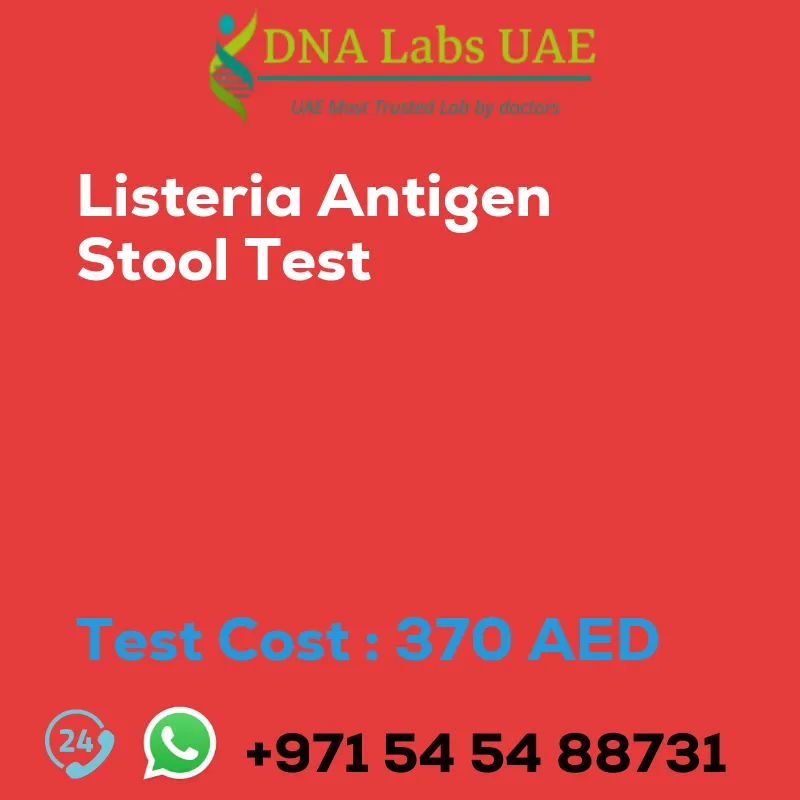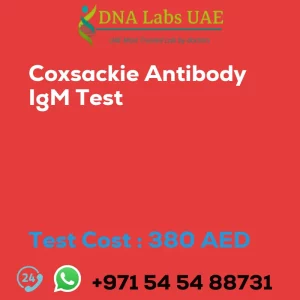LISTERIA ANTIGEN STOOL Test
Test Name: LISTERIA ANTIGEN STOOL Test
Components: Price – 370.0 AED
Sample Condition: 5g fresh stool in a sterile screw capped container. Ship refrigerated. DO NOT FREEZE.
Report Delivery: Sample Daily 1 pm; Report Same day
Method: ICT
Test type: Infections
Doctor: Gastroenterologist
Test Department:
Pre Test Information: No special preparation required
Test Details
The Listeria antigen stool test is a diagnostic test used to detect the presence of Listeria monocytogenes antigens in stool samples. Listeria monocytogenes is a bacterium that can cause serious infections, especially in individuals with weakened immune systems, pregnant women, and newborns.
The test involves collecting a stool sample from the patient and analyzing it for the presence of Listeria antigens using specific antibodies. The antibodies will bind to any Listeria antigens present in the sample, and this binding can be detected through various methods, such as enzyme-linked immunosorbent assay (ELISA) or polymerase chain reaction (PCR).
The Listeria antigen stool test is primarily used to diagnose gastrointestinal infections caused by Listeria monocytogenes. Symptoms of Listeria infection can include fever, muscle aches, nausea, and diarrhea. In severe cases, the infection can spread to the bloodstream and other organs, leading to more serious complications.
Prompt diagnosis and treatment of Listeria infections are crucial, especially in high-risk individuals. Treatment typically involves antibiotics, and early detection through the Listeria antigen stool test can help guide appropriate therapy.
It is important to note that the Listeria antigen stool test is not a routine test and is usually only ordered when there is a suspicion of Listeria infection based on the patient’s symptoms and risk factors. The test should be interpreted in conjunction with clinical findings and other laboratory tests to make an accurate diagnosis.
| Test Name | LISTERIA ANTIGEN STOOL Test |
|---|---|
| Components | |
| Price | 370.0 AED |
| Sample Condition | 5g fresh stool in a sterile screw capped container. Ship refrigerated. DO NOT FREEZE. |
| Report Delivery | Sample Daily 1 pm; Report Same day |
| Method | ICT |
| Test type | Infections |
| Doctor | Gastroenterologist |
| Test Department: | |
| Pre Test Information | No special preparation required |
| Test Details |
The Listeria antigen stool test is a diagnostic test used to detect the presence of Listeria monocytogenes antigens in stool samples. Listeria monocytogenes is a bacterium that can cause serious infections, especially in individuals with weakened immune systems, pregnant women, and newborns. The test involves collecting a stool sample from the patient and analyzing it for the presence of Listeria antigens using specific antibodies. The antibodies will bind to any Listeria antigens present in the sample, and this binding can be detected through various methods, such as enzyme-linked immunosorbent assay (ELISA) or polymerase chain reaction (PCR). The Listeria antigen stool test is primarily used to diagnose gastrointestinal infections caused by Listeria monocytogenes. Symptoms of Listeria infection can include fever, muscle aches, nausea, and diarrhea. In severe cases, the infection can spread to the bloodstream and other organs, leading to more serious complications. Prompt diagnosis and treatment of Listeria infections are crucial, especially in high-risk individuals. Treatment typically involves antibiotics, and early detection through the Listeria antigen stool test can help guide appropriate therapy. It is important to note that the Listeria antigen stool test is not a routine test and is usually only ordered when there is a suspicion of Listeria infection based on the patient’s symptoms and risk factors. The test should be interpreted in conjunction with clinical findings and other laboratory tests to make an accurate diagnosis. |







